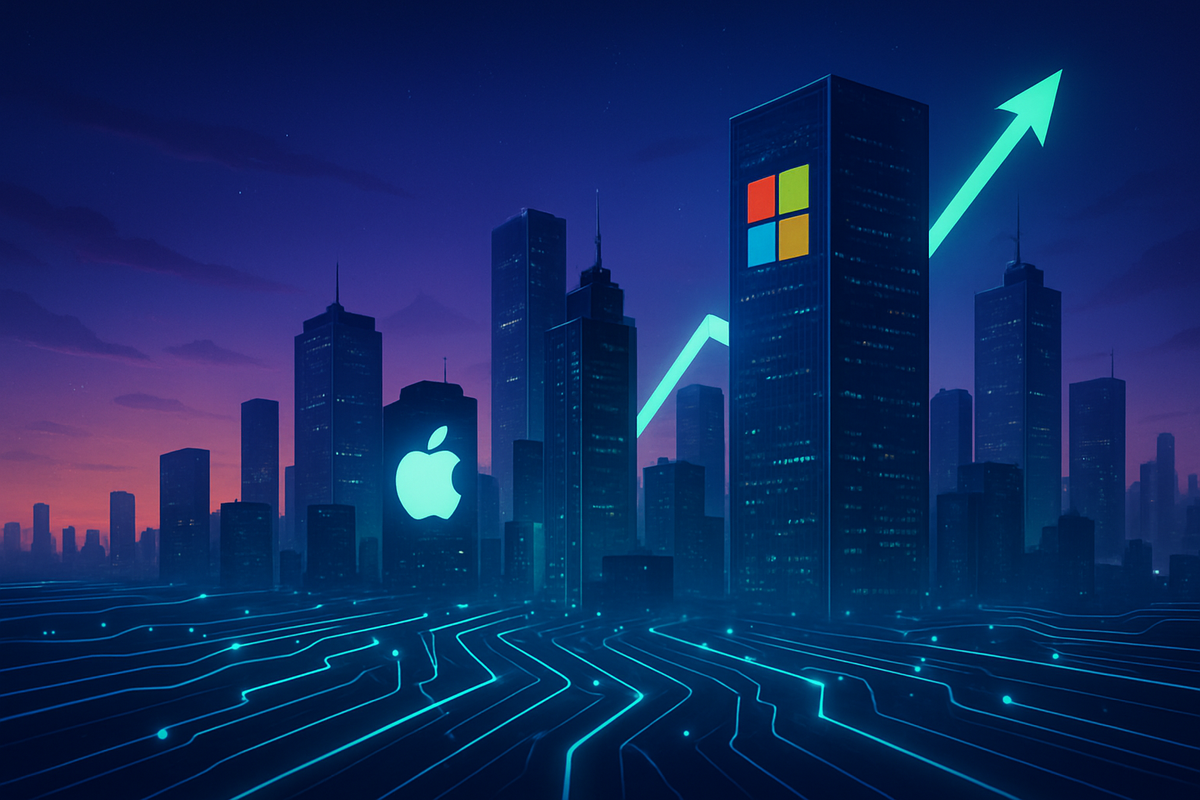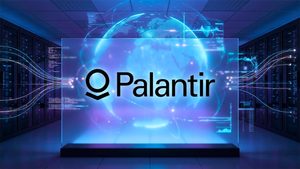
NEW YORK, NY – October 28, 2025 – The technology sector of the S&P 500 experienced a formidable surge today, with the Technology Select Sector SPDR (XLK) climbing an impressive 1.9% and the S&P 500 Information Technology (Sector) recording a 2.02% gain. This robust performance was significantly bolstered by the continued dominance of the "Magnificent 7" tech giants, pervasive optimism surrounding artificial intelligence (AI) innovation, and two landmark events: Microsoft's (NASDAQ: MSFT) solidified pact with OpenAI and Apple's (NASDAQ: AAPL) brief, yet historic, surpassing of a $4 trillion market capitalization. The immediate implication is a reinforcement of the tech sector's leading role in the broader market, driven by strategic advancements and sustained investor confidence in disruptive technologies.
The day's bullish sentiment underscores a broader trend of technology leading market rallies, with these mega-cap companies acting as primary engines for growth. Investors are increasingly betting on the transformative potential of AI, and strategic alliances like the one between Microsoft and OpenAI are seen as validation of this future. Apple's unprecedented valuation further highlights the market's appreciation for established innovation and strong consumer ecosystems, even as the company navigates the rapidly evolving AI landscape.
Unpacking the Tech Tsunami: Key Drivers and Market Reactions
Today's exceptional performance in the S&P 500 technology sector was a culmination of several high-impact developments. The "Magnificent 7" – Microsoft (NASDAQ: MSFT), Meta Platforms (NASDAQ: META), Amazon.com (NASDAQ: AMZN), Apple (NASDAQ: AAPL), NVIDIA (NASDAQ: NVDA), Alphabet (NASDAQ: GOOGL), and Tesla (NASDAQ: TSLA) – once again demonstrated their outsized influence, with individual gains contributing substantially to the sector's uplift. Microsoft, a pivotal member of this elite group, saw its stock price climb by 1.55% on October 25th and again on October 26th, preceding today's broader sector rally.
A significant catalyst was the finalization of a new agreement between Microsoft and OpenAI, announced today, October 28, 2025. This landmark pact grants Microsoft a 27% ownership stake in OpenAI, valued at approximately $135 billion, and secures Microsoft's access to OpenAI's cutting-edge AI technology, including advanced models capable of achieving Artificial General Intelligence (AGI), until at least 2032. In return, OpenAI has committed to purchasing $250 billion worth of Azure cloud computing services from Microsoft, solidifying a symbiotic relationship that positions Microsoft at the vanguard of the AI revolution. This strategic alliance sent immediate positive ripples through the market, reinforcing investor belief in Microsoft's long-term growth trajectory.
Adding to the day's excitement, Apple achieved a historic milestone by briefly touching a market capitalization of $4 trillion on October 28, 2025. This makes Apple only the third public company to reach this staggering valuation, following NVIDIA (NASDAQ: NVDA) and Microsoft (NASDAQ: MSFT). The surge was primarily fueled by robust demand for its latest iPhone 17 series, which reportedly outsold its predecessor by 14% in its initial sales period across China and the United States. Anticipation surrounding new product launches ahead of the holiday season, including updated iPad Pro, Vision Pro, and MacBook Pro models featuring the new M5 chip, also played a crucial role, showcasing Apple's enduring strength in product innovation and consumer appeal.
The market's initial reaction has been overwhelmingly positive, with analysts highlighting the strategic depth of the Microsoft-OpenAI deal and Apple's continued ability to innovate and capture market share. While some concerns about stretched valuations in the AI space persist, the concrete advancements and strong financial performance of these tech behemoths are currently outweighing any cautionary sentiment, driving broad investor optimism.
The Shifting Landscape: Winners and Potential Challengers
The current market dynamics, characterized by AI euphoria and the dominance of mega-cap tech, clearly delineate a set of likely winners and those facing significant challenges. The "Magnificent 7" tech giants are undoubtedly the primary beneficiaries. Companies like NVIDIA (NASDAQ: NVDA), a leader in AI chip development, and Alphabet (NASDAQ: GOOGL), with its extensive AI research and integration across its vast ecosystem, stand to gain immensely from the escalating demand for AI infrastructure and services. Microsoft (NASDAQ: MSFT) has cemented its position as a key player through its strategic OpenAI investment, ensuring its Azure cloud platform remains central to AI development. Apple (NASDAQ: AAPL), despite some scrutiny regarding its pace in generative AI, continues to thrive on strong product cycles and its unparalleled brand loyalty, pushing its valuation to new heights. Meta Platforms (NASDAQ: META) is heavily investing in AI for its social platforms and metaverse ambitions, while Amazon.com (NASDAQ: AMZN) leverages AI for its AWS cloud services and e-commerce operations. Tesla (NASDAQ: TSLA) continues to push AI in autonomous driving and robotics.
Conversely, companies that fail to adequately invest in or adapt to the AI revolution may find themselves increasingly marginalized. Smaller technology firms lacking the capital or research capabilities to compete with the "Magnificent 7" in AI innovation could struggle to maintain relevance. Traditional industries that do not integrate AI into their operations risk falling behind in efficiency and competitive advantage. Furthermore, the immense capital requirements for AI development and deployment could exacerbate the competitive gap, making it harder for new entrants to challenge established tech giants.
The ripple effects extend beyond direct competitors. Partners of the "Magnificent 7" that contribute to their AI ecosystems, such as semiconductor manufacturers or specialized software developers, could also see significant growth. However, those reliant on outdated technologies or business models face the imperative to pivot strategically or risk obsolescence in an increasingly AI-driven market. The concentration of market gains in a few tech giants also raises questions about market breadth and the health of the broader economy, potentially creating an environment where a select few dictate market direction.
Wider Significance: A New Era of Tech Dominance
This period of intense technological advancement and market concentration fits squarely into broader industry trends signaling a new era of tech dominance, particularly driven by artificial intelligence. The "AI revolution" is not merely a buzzword; it's a fundamental shift impacting every sector, from healthcare and finance to manufacturing and entertainment. The substantial investments by the "Magnificent 7" in AI research and infrastructure highlight a race for technological supremacy, where the winners will likely shape the future of global commerce and society. This event underscores the increasing importance of digital infrastructure and AI capabilities as core economic drivers.
The potential ripple effects on competitors and partners are profound. For competitors, the bar for innovation has been raised significantly. Smaller tech companies and even other large enterprises not among the "Magnificent 7" must now accelerate their AI strategies or risk being left behind. Partners supplying components or services to these tech behemoths, particularly in areas like advanced semiconductors, cloud infrastructure, and data analytics, are likely to see increased demand. However, there's also the risk of these giants vertically integrating, potentially squeezing out smaller players in their supply chains.
Regulatory and policy implications are also coming into sharper focus. The immense market capitalization and influence of companies like Apple and Microsoft, especially with their strategic AI acquisitions, are likely to attract heightened scrutiny from antitrust regulators globally. Concerns about data privacy, algorithmic bias, and the ethical deployment of powerful AI models will undoubtedly lead to new legislative efforts and policy debates. The historical precedent of the dot-com bubble often surfaces in discussions about current AI valuations, with some analysts warning of potential overexuberance. However, proponents argue that today's AI advancements are backed by tangible technological progress and real-world applications, unlike some of the speculative ventures of the late 1990s. The challenge for policymakers will be to foster innovation while preventing monopolistic practices and mitigating societal risks.
What Comes Next: Navigating the AI Frontier
Looking ahead, the short-term outlook for the technology sector, particularly for the "Magnificent 7," appears bullish, fueled by continued AI innovation and strategic corporate maneuvers. We can anticipate sustained investor interest in AI-related stocks and further advancements in generative AI, machine learning, and autonomous systems. However, market volatility could increase as investors grapple with questions of valuation sustainability and the pace of AI adoption across different industries. The long-term possibilities are vast, ranging from entirely new industries emerging from AI breakthroughs to fundamental shifts in how existing businesses operate, promising enhanced productivity and efficiency.
Potential strategic pivots or adaptations will be crucial for companies across the spectrum. Tech giants will likely continue to acquire promising AI startups, invest heavily in R&D, and integrate AI more deeply into their core product offerings. Non-tech companies will need to identify how AI can optimize their operations, personalize customer experiences, and create new revenue streams, necessitating significant investments in talent and technology. For smaller players, strategic partnerships or niche specialization within the AI ecosystem could be vital for survival and growth.
Market opportunities will emerge in areas like specialized AI hardware, AI-powered cybersecurity solutions, ethical AI development and auditing tools, and AI consulting services. Challenges will include navigating complex regulatory environments, managing the societal impact of AI (e.g., job displacement), and addressing the significant energy demands of large-scale AI operations. Potential scenarios range from a continued, steady growth trajectory for the tech sector, albeit with periodic corrections, to a more pronounced "AI bubble" if valuations become detached from underlying fundamentals. Outcomes will heavily depend on the real-world utility of AI, corporate execution, and the regulatory response to its rapid evolution.
Wrap-up: A Transformative Era for Tech and Beyond
Today's exceptional performance in the S&P 500 technology sector, marked by a 1.9% gain for the XLK and a 2.02% rise for the S&P 500 Information Technology (Sector), underscores a pivotal moment in financial markets. The "Magnificent 7" continue to be the primary drivers, with the profound implications of AI innovation, Microsoft's (NASDAQ: MSFT) strategic pact with OpenAI, and Apple's (NASDAQ: AAPL) brief ascent to a $4 trillion market capitalization serving as key takeaways. This event is not merely a single-day market fluctuation but a strong indicator of a transformative era where technology, particularly AI, is reshaping economic landscapes and investment paradigms.
Moving forward, the market will likely remain highly attuned to developments in AI, corporate earnings from the tech giants, and any shifts in macroeconomic conditions, such as inflation data and interest rate policies. While the current optimism is palpable, investors should remain vigilant regarding potential overvaluations and the inherent risks associated with rapidly evolving technologies. The concentration of market gains within a few companies also warrants careful consideration regarding portfolio diversification and risk management.
The lasting impact of this period will likely be a more integrated, AI-driven global economy, with the "Magnificent 7" continuing to exert significant influence. What investors should watch for in the coming months includes further advancements in AI capabilities, the regulatory response to big tech and AI, the earnings reports of these dominant companies, and any signs of AI adoption broadening across a wider range of industries. This technological revolution promises both unprecedented opportunities and significant challenges, making informed analysis and strategic positioning more critical than ever.
This content is intended for informational purposes only and is not financial advice




